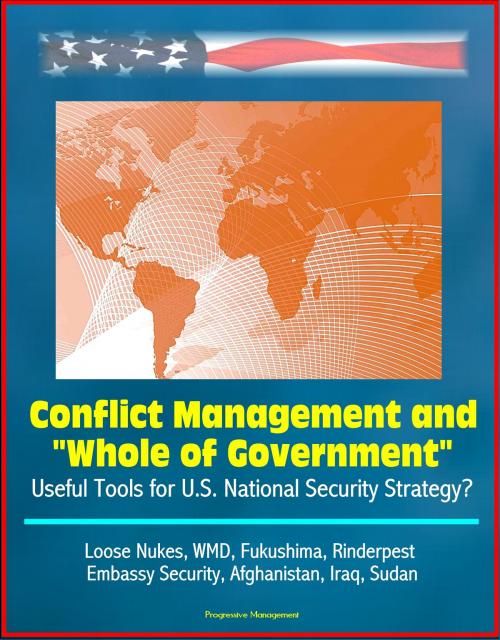Conflict Management and "Whole of Government": Useful Tools for U.S. National Security Strategy? Loose Nukes, WMD, Fukushima, Rinderpest, Embassy Security, Afghanistan, Iraq, Sudan
Nonfiction, Social & Cultural Studies, Political Science| Author: | Progressive Management | ISBN: | 9781301763689 |
| Publisher: | Progressive Management | Publication: | March 12, 2013 |
| Imprint: | Smashwords Edition | Language: | English |
| Author: | Progressive Management |
| ISBN: | 9781301763689 |
| Publisher: | Progressive Management |
| Publication: | March 12, 2013 |
| Imprint: | Smashwords Edition |
| Language: | English |
Throughout most of the 20th century, national security focused primarily, and sometimes exclusively, on military affairs. In the 21st century, this has changed as new and more comprehensive ways of thinking about, studying, and planning for national security and global security are being adopted in response to new security challenges and threats that go beyond the dangers posed by traditional causes of war and conflict. In addition to terrorism, these other threats to security are posed by, but not limited to, shortfalls of energy and nonfuel mineral resources, scarcity of food and fresh water, encroaching desertification, and cyber attacks. To some, these new challenges and threats present as much, and over time perhaps more, of a challenge and threat to security as do guns, bombs, and missiles.
This volume presents central arguments and key findings of a symposium, tracing the genesis of the conception of a WoG approach, critically examining current WoG practices, and drawing lessons from the operational contexts of Iraq and Afghanistan. The first part of the book describes the overall global security context within which peace building and stability operations are currently conducted, examines the merits of WoG approaches as effective conflict management strategies, and discusses their efficacy for responding to a range of emerging threats. In Chapter 2, the author provides a framing analysis of the security environment of the early 21st century with specific focus on the role and position of the United States, and outlines the issues and challenges Washington confronts as it attempts to address emerging threats through an integrated interagency approach. While it is easy to declare that agencies ought to cooperate, Kennedy argues, such cooperation is neither easily embraced nor successfully implemented. Effective integration will require giving up agency fiefdoms and jointly addressing threats ranging from fragile and failing states to terrorism and totalitarianism.
- Introduction * Part I: * 2. Security Sector Reform: 12 Central Questions for Responding to the Security Challenges of the 21st Century * 3. The Puzzle of National Security Planning for the Whole of Government * 4. Development is Destruction, and Other Things You Weren't Told at School * Part II: * 5. Where Does Whole of Government Meet Whole of Society? * 6. Security System Reform in Weak or Fragile States: A Threefold Challenge to the Whole of Government Approach * 7. A Whole Lot of Substance or a Whole Lot of Rhetoric? A Perspective on a Whole of Government Approach to Security Challenges * 8. Whole of Government in Diplomacy and Development: Whole or Hole? * 9. The National Security Staff: What's Missing in Whole of Government Approaches to National Security * Part III: * 10. Lessons from Iraq and Afghanistan— Looking from Outside the Box * 11. Civil-Military Teaming: A Solution? * 12. Ethical Lessons of Maximizing Private Contractor Value in Afghanistan and Iraq * 13. Multiethnic Conflicts in U.S. Military Theaters Overseas: Intercultural Imperatives
Throughout most of the 20th century, national security focused primarily, and sometimes exclusively, on military affairs. In the 21st century, this has changed as new and more comprehensive ways of thinking about, studying, and planning for national security and global security are being adopted in response to new security challenges and threats that go beyond the dangers posed by traditional causes of war and conflict. In addition to terrorism, these other threats to security are posed by, but not limited to, shortfalls of energy and nonfuel mineral resources, scarcity of food and fresh water, encroaching desertification, and cyber attacks. To some, these new challenges and threats present as much, and over time perhaps more, of a challenge and threat to security as do guns, bombs, and missiles.
This volume presents central arguments and key findings of a symposium, tracing the genesis of the conception of a WoG approach, critically examining current WoG practices, and drawing lessons from the operational contexts of Iraq and Afghanistan. The first part of the book describes the overall global security context within which peace building and stability operations are currently conducted, examines the merits of WoG approaches as effective conflict management strategies, and discusses their efficacy for responding to a range of emerging threats. In Chapter 2, the author provides a framing analysis of the security environment of the early 21st century with specific focus on the role and position of the United States, and outlines the issues and challenges Washington confronts as it attempts to address emerging threats through an integrated interagency approach. While it is easy to declare that agencies ought to cooperate, Kennedy argues, such cooperation is neither easily embraced nor successfully implemented. Effective integration will require giving up agency fiefdoms and jointly addressing threats ranging from fragile and failing states to terrorism and totalitarianism.
- Introduction * Part I: * 2. Security Sector Reform: 12 Central Questions for Responding to the Security Challenges of the 21st Century * 3. The Puzzle of National Security Planning for the Whole of Government * 4. Development is Destruction, and Other Things You Weren't Told at School * Part II: * 5. Where Does Whole of Government Meet Whole of Society? * 6. Security System Reform in Weak or Fragile States: A Threefold Challenge to the Whole of Government Approach * 7. A Whole Lot of Substance or a Whole Lot of Rhetoric? A Perspective on a Whole of Government Approach to Security Challenges * 8. Whole of Government in Diplomacy and Development: Whole or Hole? * 9. The National Security Staff: What's Missing in Whole of Government Approaches to National Security * Part III: * 10. Lessons from Iraq and Afghanistan— Looking from Outside the Box * 11. Civil-Military Teaming: A Solution? * 12. Ethical Lessons of Maximizing Private Contractor Value in Afghanistan and Iraq * 13. Multiethnic Conflicts in U.S. Military Theaters Overseas: Intercultural Imperatives















